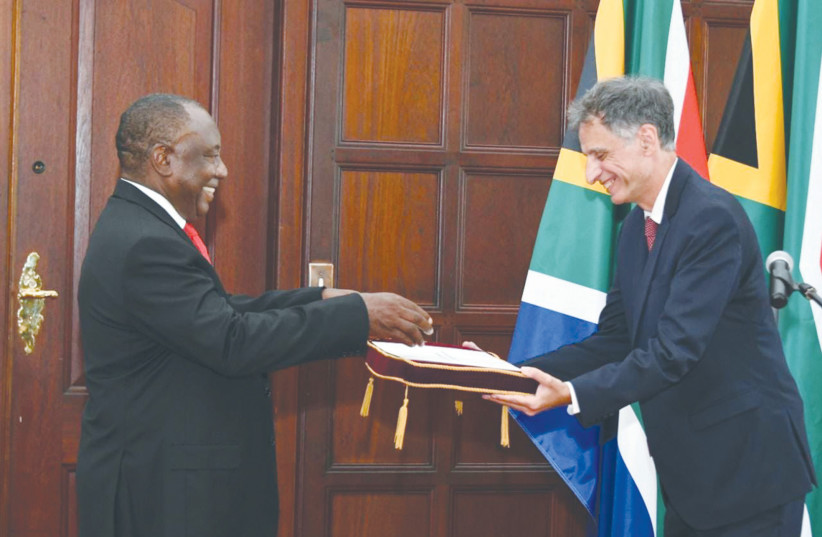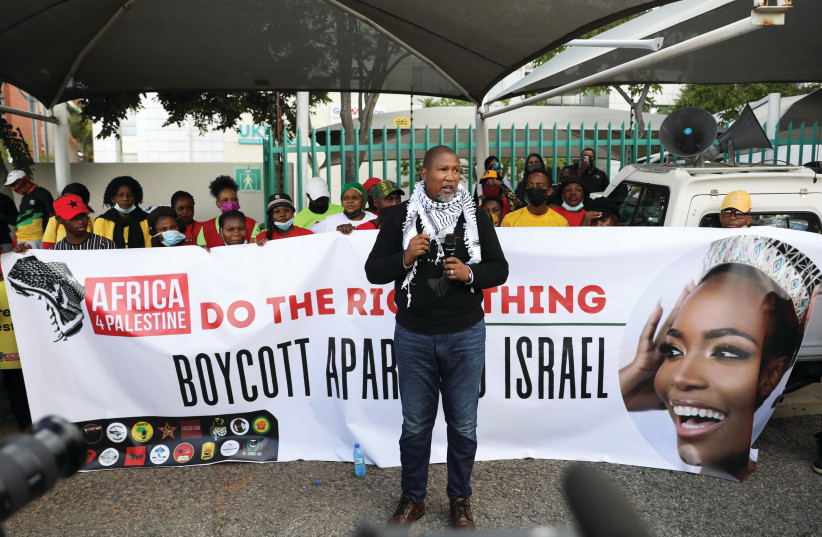 Wspierane przez państwo Media Narodowe promują antysemicką książkę
Wspierane przez państwo Media Narodowe promują antysemicką książkę
Wiktor Ferfecki
Telewizja należąca do stowarzyszenia dotowanego przez rząd zrobiła promocję książki, według której Żydzi to „plemię pasożytnicze”.
.
 Kadr z materiału w Mediach Narodowych poświęconego książce “Poznaj Żyda”
Kadr z materiału w Mediach Narodowych poświęconego książce “Poznaj Żyda”
16 stereotypowo przedstawionych Żydów, którzy na ramionach mają opaski z napisami m.in. „rzetelna prasa”, „LGBT” albo „wolne sądy” – takie rysunki trafiły na okładkę nowego wydania książki „Poznaj Żyda!” przedwojennego publicysty Teodora Jeske-Choińskiego. Jej promocję przeprowadził w Wielką Sobotę kanał na YouTubie Media Narodowe.
Audycję zilustrowano obrazkiem przedstawiającym podobny stereotypowy rysunek Żyda. W programie wystąpił wydawca książki Przemysław Holocher. – Żydzi, którzy odnoszą się do Talmudu i kultury wybraństwa, sami tkwią w ogromnej ciemnocie – perorował.
Anna Tatar ze stowarzyszenia antyfaszystowskiego Nigdy Więcej treść audycji uważa za skandaliczną. – Jeske-Choiński był czołowym ideologiem antysemityzmu. Pochwalał m.in. wypędzenie Żydów z Litwy czy pogromy antyżydowskie – przypomina. – Nie ma niczego złego w wydawaniu tekstów mogących być źródłami historycznymi, pod warunkiem, że będą wyposażone w aparat krytyczny. Jednak przedruk tekstu bez słowa komentarza jest niczym innym, jak tylko powielaniem jego tez – dodaje. Jej zdaniem „Poznaj Żyda!” jest po prostu publikacją antysemicką. Zauważa, że już w jednym z pierwszych zdań autor nazywa Żydów „plemieniem pasożytniczym”, które „ssie naszą krew”.
Zdaniem Kalinowskiego rysunek Żyda z garbatym nosem zapowiadający program „jest znanym memem”
Zaś Media Narodowe są wspierane przez państwo. Należą do Stowarzyszenia Marsz Niepodległości Roberta Bąkiewicza, które ze Stowarzyszeniem Straż Narodowa otrzymało 3 mln dotacji z Funduszu Patriotycznego, podległego resortowi kultury. Same Media Narodowe dostały 198 tys. z Narodowego Instytutu Wolności.
Czy Ministerstwo Kultury czuje się współodpowiedzialne za audycje w kanale? Z odpowiedzi, które dostaliśmy z resortu, wynika, że nie. „Projekty złożone w ramach Funduszu Patriotycznego oceniane są przez ekspertów wg kryteriów zawartych w regulaminie funduszu. Eksperci dokonują oceny na podstawie treści wniosków złożonych w ramach konkursu. Ocenie merytorycznej podlegają każdorazowo wyłącznie zadania wskazane we wnioskach” – czytamy.
Instytut Dziedzictwa Myśli Narodowej, który nadzoruje Fundusz Patriotyczny, podkreśla, że obecne wydanie książki „Poznaj Żyda!” jest tylko jednym z wielu, a praca ta jest ogólnodostępna, m.in w formie zdigitalizowanej w bibliotece cyfrowej POLONA.
Problem w tym, że to niejedyna kontrowersyjna audycja Mediów Narodowych. Na początku kwietnia Stowarzyszenie Nigdy Więcej wydało raport na temat hejtu wobec Ukraińców i powielania rosyjskiej propagandy. Sześć razy wspomina on o treściach w Mediach Narodowych, m.in. o audycji z udziałem publicysty Marcina Masnego, który insynuował, że w Ukrainie znajdują się „amerykańskie laboratoria z patogenami”, będące zagrożeniem dla Rosji. I inny publicysta Marian Miszalski rozwijał prorosyjską teorię spiskową, zgodnie z którą Ukraina ma być zasiedlona przez Żydów.
Tomasz Kalinowski, redaktor naczelny serwisu internetowego Mediów Narodowych, podkreśla jednak, że w żaden sposób nie są one antyukraińskie. – W ostatnim czasie zakończyliśmy współpracę z jednym z redaktorów, który przemycał takie treści, a program z panem Masnym został usunięty – mówi. Dodaje, że po pierwszym tygodniu wojny Media Narodowe przeprowadziły charytatywną transmisję dla uchodźców, zrobiły też m.in. wywiad z członkiem parlamentu ukraińskiego i reportaż z Medyki.
A materiał o „Poznaj Żyda!”? Zdaniem Kalinowskiego rysunek Żyda z garbatym nosem zapowiadający program „jest znanym memem”, więc „trzeba podejść do niego z dystansem”.
Zawartość publikowanych artykułów i materiałów nie reprezentuje poglądów ani opinii Reunion’68,
ani też webmastera Blogu Reunion’68, chyba ze jest to wyraźnie zaznaczone.
Twoje uwagi, linki, własne artykuły lub wiadomości prześlij na adres:
webmaster@reunion68.com





